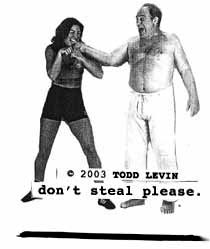


|
|
HOW TO QUESTION YOUR EXISTENCE (AGAIN).
Last week, another comic was generous enough to bring me out for a very rare, out-of-town stand-up set, at a very popular comedy club in Long Island. (I'm withholding the name, because I don't blame the club for what happened next.) I'd never been to the club before, as a performer or a member of the audience. In fact, my only knowledge of it was informed by the documentary, COMEDIAN. There's a scene in the film, when Jerry Seinfeld is well into making his stand-up comeback, and he steps offstage at a club, angry about the fact that several people were talking loudly during his set, and remarks to his manager (kind of unforgettably), "I mean, how big do you have to be [to get them to listen]? It was like monkeys throwing their shit in there." That's the Long Island Club. The best thing I can say about my set at LIC – which is a gigantic space, and seats about 300 drunk people – is that I remained relatively poised throughout my set. That means this stuff is coming a little easier to me, gradually, which is a nice thing to discover. However, my time onstage was largely miserable. The people who were with me stayed with me, but I could see other people tuning out as I went along. Literally see them tuning out, one by one, like I was moving along a switchboard, turning out all the stage lights. At one point onstage, I suggested that perhaps, on my best day, I could beat up one small, skinny woman in the front row. It was one of those things I nervously added to the end of a joke, just because I felt it would be a good idea to involve the audience a bit in my misery. It's a statement that does not beg a response, but it got one. The skinny woman disagreed, loudly, and I joked along with her, admitting she was probably right. Then she continued, very loudly, to detail all of the ways she was positive she could beat me up. And every time I tried to laugh along with her and move on, she would add things like, "I'm really serious. I could take you. I'm strong." It was one of those amazing teetering moments that occasionally occurs onstage, where it could easily tip one way or the other, away from or directly into disaster. By chance more than talent, I managed to avert complete disaster in that moment, but I spent the rest of my time onstage creeping hand-over-hand along the precipice. When it was all over I felt winded, like I'd been running a treadmill with a gun pointed to my temple. (I couldn't hear her set from the green room, but during the next comic's set a fire alarm was tripped and, understandably, upstaged her for a few minutes. That's a considerably more challenging distraction than being threatened by a featherweight "MR F" drunk in the front row.) A few of the other comics who performed that night complained about the audience being largely thick-headed or inbred – possibly as a means of consulation – but I try to avoid casting an audience in a negative light when I feel unsatisfied with a set. It's much more satisfying to turn it all inward. I did, however, leave that night thinking about a few things I've heard from other comics, who criticize "alternative" comics who perform within the safe confines of like-minded audiences. (Even Woody Allen did this, building his stand-up career in coffee houses and cabaret bars. If you ever listen to his "Stand-Up Comic" album, which is one of my favorite comedy albums of all time, you'll hear that it's an incredibly small, smart and approving audience. He did not record it at The Laughing Gas Chamber in Passaic, New Jersey.) And in interviews with Chris Rock (a huge Woody Allen fan, by the way), he often evangelizes about the importance of being able to make any audience laugh, and talks about his confidence in being able to do so. I would love to be funny to all but, honestly, I don't know if I am. It's a weird thing to realize, and I kind of struggle with it sometimes. I've done really well in front of comedy club audiences, and I had a great time in front of a TV audience who had never seen me before, but get me out of large cities like New York City, and I don't know. Maybe I'm not going to be Bruce Springsteen or The Rolling Stones; maybe I'm going to be Man or Astroman, or Jandek. What would happen if you put those artists in front of a Madison Square Garden audience? I have a CD that collects sets from Devo's earliest live shows, and on one of the shows they've been booked by a radio station, as a practical joke, to open up for Sun Ra. The audience thinks they're going to get a Bad Company cover band but, instead, out comes DEVO. On the album, you can hear the audience of hippies losing their shit with anger during DEVO's purposefull relentless version of "Jocko Homo"; the recording even picks up people in the crowd threatening to beat the shit out of the band. DEVO should not open for Sun Ra, period. And sometimes I wonder if I should be following a comedian who tells the following joke: "I was relieving myself in a public restroom and the attendant walked in and hung a sign that said, "WET FLOOR" – so I did!" This experience reminds me of something Adam Goldberg's character, Mike, says in the movie, Dazed and Confused. (I'm going to paraphrase, even if it's lazy to do so.) He's explaining why he has decided he no longer wants to pursue being an ACLU lawyer after he graduates high school, and he relates a revelatory experience he had at a DMV or some other depressing public place. He tells his friends, as he was looking around the room, he realized these were the kinds of people he would end up defending if he were a lawyer. "And I realized," he says, "I don't like those people." I'm still trying to figure out whether or not I like these people, I guess. I mean, if there are audiences filled with stupid people, as so many comics claim there are, why would you want to perform for idiots? Is there some insanely narcissistic belief that our set of jokes about masturbating and online dating and crazy chain restaurants will be enlightening for these people? That they need it? (Bonus: I closed my set at Long Island Club with a joke I haven't told in a while. I love the joke, and it can get either a great response or a confused and disturbed one. Guess which one it got at LIC? You can hear a clip of me telling the final punchline, without context, and that skinny drunk woman in the front row reacting to it, right here.) |


